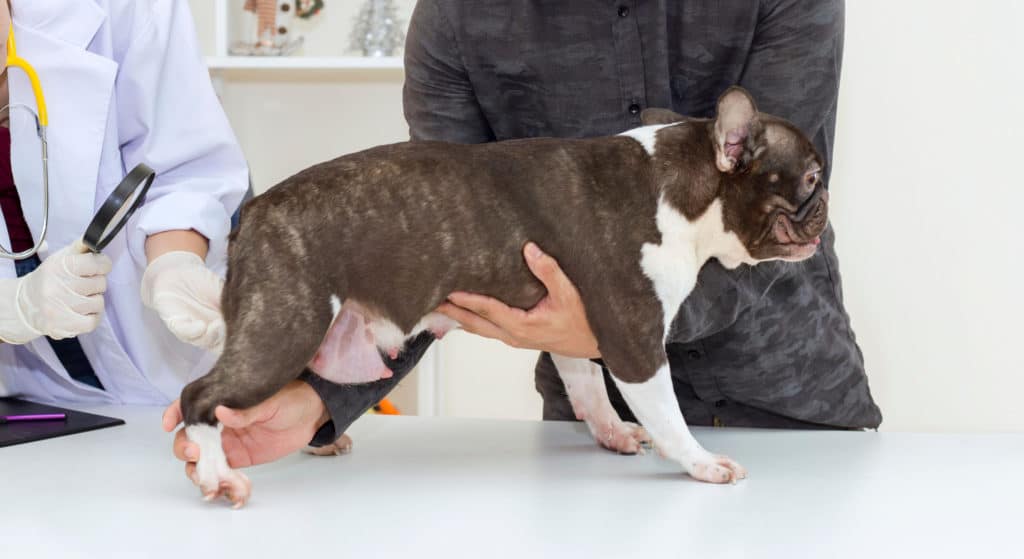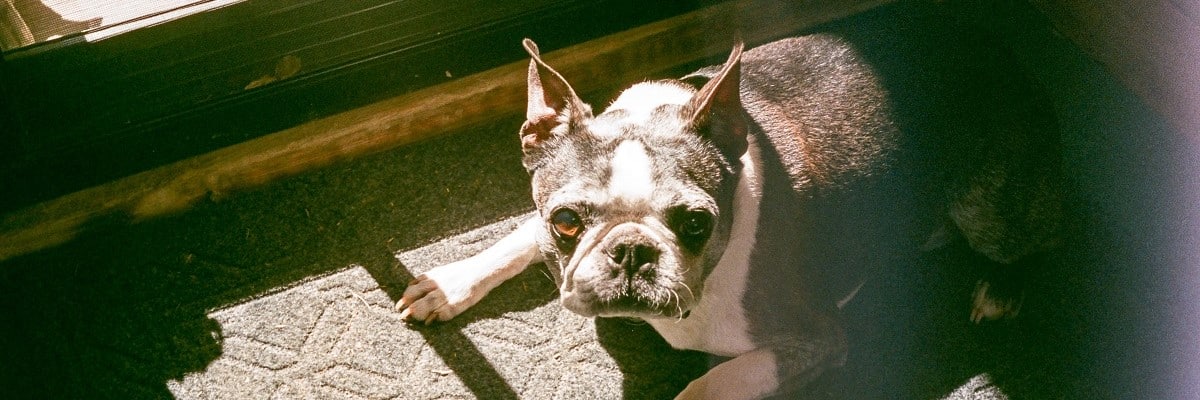My French Bulldog Is Bleeding From Anus: There can be several reasons that this could be happening—these include Anal gland problems, foreign body ingestion, rat poisoning, Hemorrhage, and Constipation. If your French Bulldog has blood coming from its Anus, you, like anybody, would be worried. Bleeding from the rectum can be a serious condition that your Frenchie is experiencing.
Anal Gland Problems Can Cause Bleeding
Among the most likely reasons for rectal bleeding is an anal gland issue. Just inside your Frenchies anus are two scent glands. Usually, these scent glands emit a small quantity of odour on the fecal matter as it passes.
Creating a distinct smell that tells other dogs who the poo belongs to. A dog can also emit from their anal glands in reaction to fear and anger — if you have ever been in the vicinity of anal gland liquid, you will know of its scent, which can be described as a foul fishy smell.
How Does Anal Abscess Develop?
Your Frenchies anal glads can become impaired when an obstruction in the duct passes from the glands to the Anus.
The common causes of obstruction throughout the duct include producing softer stool or diarrhea infections that lead to the inflammation of the sac and duct.
It’s a popular misunderstanding that your Frenchie scooting implies that they have worms. Interestingly, worms and parasites are not the cause of inflammation of the anal glands.
Your French Bulldogs’ anal glands are usually enlarged at this point and not that painful. That being said, when an anal gland infection occurs, your Frenchies rectum can become sore and swollen and often lead to an abscess.
As well as, there may be bleeding from the Anus. Anal gland infection occurs when obstruction of the duct causes inflammation to the local area.
Symptoms of Anal Gland Issues
When this occurs, your Frenchie may show signs of anal gland issues, the most common one being:
| Bleeding and swelling near the anal region |
| Excessive licking of the anal area and hind end |
| Straining to defecate |
| Releasing a sudden foul (fishy) odour |
| Leaking of anal gland fluid |
| Scooting and discomfort of the rear end |
How Is It Treated
You may not be up to the challenge; however, this method can be performed at home if you feel confident doing this. It is highly recommended that your vet show you how to do this for the first time.
You should have a second person around to help your Frenchie stand still while performing the procedure.
Expressing poorly can create irritation and contribute to more issues, so ensure that you can execute tasks appropriately. Below is a video that explains the process. Warning some people may find this hard to watch.
If your Frenchies scooting is a chronic problem at home and your French Bulldog’s anal sacs need to be expressed frequently, you may choose to remove the glads by surgery.
Little French Dog is a participant in the Amazon Services LLC Associates Program, an affiliate advertising program designed to provide a means for sites to earn advertising fees by advertising and linking to Amazon.com.
Can Foreign Body Ingestion Cause Bleeding In Dogs
When your French Bulldog eats something, it will take between 10-24 hours to pass through the whole digestive system. Even so, certain things will take longer.
Often, items are too large to move through the digestive system, and if this is the situation, they will cause obstruction.
If the foreign object makes it to the colon, it is likely to pass – but there is still a probability that it’ll be unpleasant, particularly if it is sharp. In situations like this, you will need veterinarian help.
Never pull a foreign material out of the rectum of your Frenchie. If it is still within your Frenchie, it can inflict damage to the internal tissues.
Symptoms If The Object Becomes Stuck
Look out for these common signs to see whether you ought to seek veterinary care:
| Bleeding from the rectum | Vomiting |
| Diarrhea | Abdominal tenderness or pain |
| Lack of appetite | Straining to defecate |
| Lethargy | Behavioural changes such as biting or growling |
If an object’s blockage is suspected, your vet will use x-rays to validate the condition. To identify the item, several x-rays will always be required using contrast dye (dyes).
Your veterinarian will also want to conduct blood tests to assess if the obstruction adversely affects your Frenchies’ general health.
They will also try to rule out potential causes such as enteritis, pancreatitis, parasites, or hormonal diseases like Addison’s disease.
Treatment of Foreign Body Ingestion
If your Frenchie has eaten a foreign body like a stick, a rock, or other strange objects – a few treatment options are available, depending on the health of your French Bulldog.
When your Frenchie has been excessively vomiting, crying in pain, and distressed. Then the very first thing your vet can do is offer IV fluids and pain medication.
If your Frenchie still has a foreign object in their stomach, making them vomit can make it easier for your French Bulldog to get rid of the item.
The item can also be extracted by endoscopy, during which a long tube is inserted into your Frenchies mouth and used to force the item out of the stomach.
Your vet will make suggestions and, if needed, will request that your French Bulldog be hospitalized for careful supervision.
If the object makes it into the intestine, an operation is inevitable. It is extremely necessary, as described earlier, obstruction in the intestine or abdomen will interrupt blood flow to the stomach and cause digestive issues. Within a few hours, the tissue could become necrotic.

Can Rat Poisoning Cause Bleeding In Dogs?
There are two main types of rat poison: first-generation baits such as Ratblitz that have a brief period of effect and need the bait to be ingested for a long time before it becomes fatal.
Second-generation baits like Talon and Ratsak have a long rapid onset, and a single dose can cause death.
Rat poison is an anticoagulant that reduces the body’s natural supply of vitamin K. Vitamin K is a fat-soluble vitamin important for blood coagulation.
It may take up to five days after absorption to show signs of poisoning.
Symptoms Rat Poisoning
Symptoms of poisoning are connected with bleeding, which may vary from mild symptoms, like slight bleeding of the gums, to significant bleeding from anywhere.
When your Frenchies clotting system functions correctly, these injuries are automatically fixed without even being conscious of them.
However, if the clotting system does not work, these small traumas will not be fixed and will keep bleeding, which will result in any of the below signs:
| Blood in the urine or faeces | Lethargy |
| Bruising under the skin | Pale gums |
| Bleeding from the nose and Anus | Continued bleeding from small cuts |
| Vomiting and diarrhoea | Coughing or breathing difficulties |
| Lameness | Seizures and muscle tremors |
Rat Poisoning Treatment
If you have seen your Frenchie eating rat poison, it’s essential to get them taken to the veterinarian; this is an emergency. If you’ve not seen your Frenchie consume any rat poison but notice symptoms linked to being poisoned, as mentioned above, you should see your vet again as soon as possible.
A blood test will need to be evaluated for clot formation and iron deficiency. Treatment could be as easy as giving you French Bulldog vitamin K supplements for up to 6 weeks, or it may involve more intensive care, including blood transfusions and hospital admission.
Sometimes in instances, some dogs may perish even with the most intensive care.
Hemorrhage
Canine hemorrhagic gastroenteritis affects dogs with the sudden occurrence of vomiting and diarrhea containing varying quantities of blood. It is most common in small and medium-sized breeds.
Your Frenchie may look slightly sick in the intervening 24hrs, but they can also look fully normal before the onset of symptoms. The disease rapidly progresses and urgently needs to be treated.
The cause of haemorrhagic gastroenteritis is unclear. However, bacterial toxicity appears to be responsible. Consuming spoiled food can contribute to the onset of the disorder.
A substantial loss of blood and fluid from the bloodstream to the intestinal system results in rapid, extreme dehydration and trauma.
Subsequently, the blood can become so thick that it slowly moves through the blood vessels. If left unchecked, haemorrhagic gastroenteritis will be fatal.
Symptoms of Hemorrhage
The characteristic of haemorrhagic gastroenteritis in dogs is bright or dark red blood in the stool. Here are some clear signs that your Frenchie may have haemorrhagic gastroenteritis:
| Drops of blood from the rectum |
| Stool with mixed mucous and blood |
| Clumps or pools of the bloody gelatinous fluid |
Treatment of Hemorrhage
Because it is hard to know if the Frenchies’ condition could progress seriously, veterinary treatment is required in all cases of diarrhoea, particularly for puppies and elderly dogs, as they are at greater risk of dehydration.
Veterinarian treatment is essential if your Frenchie shows vomiting, nausea, blood, pain, or fatigue.
Constipation Can Cause Bleeding
We have already written a great article about what to look for with your French Bulldog regarding constipation. Please click to read more.

